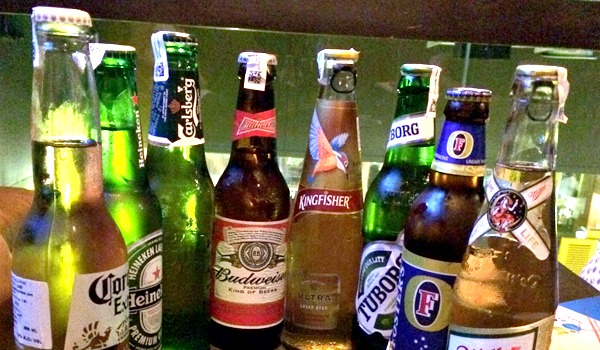Beer is likely one of the most socially acceptable and culturally cherished alcoholic beverages. It is also the oldest and the third most consumed (after water and tea) beverage in the world. The state governments in India though would rather have you drink something stronger though.
The alcohol content in beer is 5 to 8%, which is lower than wine at 12% and hard liquor (Whiskey, Vodka, Rum) which is at 42.5%. Now globally alcohol is taxed according to its alcohol content, so a tippler in France is likely to pay 5 times more taxes for hard liquor than he is to pay for beer. On the other hand an Indian pays 60% more tax on beer than he does on stronger spirits.
In most states if one buys a 100 rupee bottle of beer, 60 rupees go the government, 20 to the retailer and rest of it is spent of production and manufacturing, making India one of the most expensive countries in the world to enjoy chilled glass of beer.[1]“In 2012, India’s 1.2 billion population consumed 20 million hectoliters of beer in 2012—but that’s just 1.6 liters per person compared with 37 liters in China, 31 liters in Thailand, and 30 liters in Vietnam”, according to a report,Beeronomics 2013[2], by UBS Global, a financial services and corporate advisory firm. This is due to the fact that beer is seen as luxury product in India, consumed primarily by the upper middle class.
There are around 26 different taxes paid on beer in India, but that’s not where the impediments stop. Licenses to set up a commercial brewery can cost up to Rs. 26 lakhs in few states. And as alcohol is a state subject, there is an import fee imposed on beer that is brought into a state and an export fee on beer that goes out of a state.
According to the All India Brewer’s association, the beer industry has been growing at a flat rate of 12% annually, which is not likely to increase with the current system of regulation. Due to these restrictions alcohol makers are incentivized to produce more hard liquor. For instance with Rs 100, a consumer can buy 180ml of local whiskey, which works out to about Rs 1.3 per ml of alcohol, the same amount will buy a 650ml bottle of strong beer, but because of the lower alcohol levels, consumers pay over twice as much per ml. This indiscriminate taxation deters the consumer from seeing value in beer forcing him to opt for hard liquor.
Higher consumption of hard liquor is known to cause public health and social issues. A case in point being Kerala – the state government with its new liquor policy had shut down around 700 bars across the state, mostly serving hard spirits. To avoid a major loss of jobs in this sector 380 licenses were given to establishments selling wine and beer. This state imposed shift from hard spirits to beer and wine has drastically brought down alcohol related hospitalization, crimes, road accidents and domestic violence in the state according to government officials.
Beer, an agricultural product also promotes barley production. Barley, traditionally used as fodder in India can be transformed into a cash crop, which has been the case in Rajasthan after global beer giant SAB Miller set up a brewery there. Barley can also grow with limited irrigation thus benefiting states with acute shortage of water.
Freeing up the beer market by delinking beer from hard liquor along with rationalizing of laws, ending the licensing raj and a central taxation policy will promote foreign investment as well local entrepreneurship in the beer industry, boosting skilled employment and giving impetus to the Prime Minister’s ‘Make in India’ call.
[1] http://www.newindianexpress.com/states/telangana/Consumption-of-Beer-Highest-in-Telangana-Andhra/2015/06/04/article2847997.ece
[2]http://www.beeronomics.org/
(Archit Puri is a business student by qualification but a plethora of other things by admission. He has diversified interests like behavioral economics, game theory, culinary arts, beer, startups, game of thrones and others omitted due to lack of space.)
Post Disclaimer
The opinions expressed in this essay are those of the authors. They do not purport to reflect the opinions or views of CCS.




